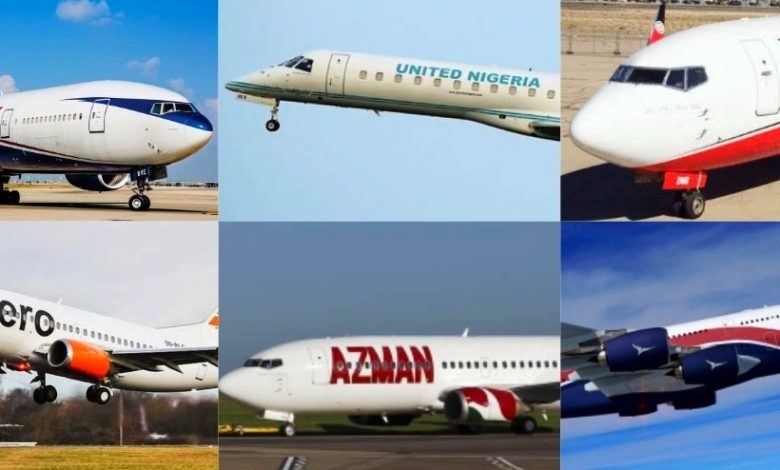The Nigerian aviation industry has witnessed an astonishing rate of airline closures, with more than 100 airlines shutting down over the past four decades.
Nigerian Airlines- During a recent event marking Air Peace’s 10th anniversary, Minister of Aviation and Aerospace Development, Festus Keyamo, voiced concerns about this staggering statistic, attributing it to a mix of economic, operational, and regulatory hurdles. This pattern of airline mortality has sparked significant debate over the sustainability of Nigeria’s aviation sector and the broader economic implications for the country.
The roots of these issues trace back to the late 1950s, when Nigeria Airways launched as the country’s first national carrier. Although it remained active until 2003, its decline foreshadowed a troubling pattern: economic instability, regulatory inconsistencies, and limited infrastructure continue to burden airlines, leading to frequent industry exits and setting the Nigerian aviation sector on a precarious path.
Key Drivers Behind Airline Failures in Nigeria
A closer look at the factors reveals why the mortality rate of Nigerian airlines remains so high:
- Economic Instability
The Nigerian economy’s heavy reliance on oil has made it susceptible to international market shifts. Sudden fluctuations in oil prices have weakened the naira, increasing operational costs for airlines. High inflation further reduces consumer travel budgets, hitting airlines’ revenues hard. Given the slim profit margins most airlines operate on, even short-term economic downturns can lead to insolvency. - Regulatory Hurdles
The Nigerian Civil Aviation Authority (NCAA) has been criticized for inconsistent policies, contributing to the challenges airlines face. Frequent policy changes and complex procedures for obtaining operational licenses disrupt business planning. “The regulatory framework needs stability and transparency,” Keyamo remarked, underscoring that clearer guidelines are essential to attract investment and sustain existing airlines. - High Operating Costs
Operating costs in Nigeria are higher than in many regions due to the scarcity of local maintenance facilities, forcing airlines to service aircraft overseas. Imported aviation fuel adds to expenses, making Nigeria one of the most expensive places for aviation fuel in Africa. Additionally, airlines have to contend with fluctuating currency exchange rates when purchasing spare parts, making cost control even harder. - Limited Infrastructure
Inadequate infrastructure, from runways to passenger terminals, reduces operational efficiency and deters potential travelers. Nigeria’s airports require modernization to match international standards. Keyamo stressed that the government is committed to upgrading airports to help airlines meet both domestic and international demand, but such projects require significant time and funding. - Management and Operational Strategy
Many Nigerian airlines struggle with operational mismanagement, often resulting from underfunding and lack of industry experience. Without solid strategic plans or market research, new airlines are vulnerable to fierce competition. This mismanagement can lead to poor customer service, ultimately eroding customer loyalty and contributing to early exits from the market.
Notable Airline Closures
The history of Nigerian aviation is punctuated by closures of several well-known airlines, each reflecting deeper systemic issues within the industry. Key examples include:
- Nigeria Airways (1958–2003): Liquidated due to financial mismanagement, this closure marked the beginning of numerous challenges in the sector.
- Bellview Airlines (1992–2009): Known for reliability, but ultimately succumbed to financial and operational pressures.
- Virgin Nigeria (2004–2009): Established in partnership with Virgin Atlantic, but struggled when government policies changed.
- Air Nigeria (2010–2012): Rebranded from Virgin Nigeria but failed to remain viable in a difficult market.
- Azman Air (2014–2023): Recently suspended flights due to safety and maintenance issues.
Government Efforts and Future Directions
In response to the high closure rate, Keyamo has outlined the government’s commitment to address fundamental issues within the sector. He advocates for a stable regulatory environment, noting, “A consistent and supportive policy framework is crucial for long-term stability.” Plans include:
- Streamlined Regulations: Simplifying procedures to encourage more efficient operations and compliance.
- Infrastructure Investments: Modernizing airports and expanding air traffic control capabilities to ensure safer, more efficient travel.
- Financial Support: The government is exploring financial assistance for airlines, providing critical support during economic downturns.
- Training Initiatives: Building skills across airline management and operations to improve safety, efficiency, and customer service.
Air Peace’s Resilience and Impact
Amidst the closures, Air Peace’s success serves as a model for navigating the industry’s challenges. Founded by Allen Oyema in 2013, the airline has grown to become Nigeria’s largest carrier, credited with strong leadership and customer-centric policies. “Our resilience stems from understanding the market and being responsive to passenger needs,” Oyema noted, acknowledging that maintaining this approach is vital for survival. Air Peace’s ability to expand operations and sustain profits offers a blueprint for other Nigerian airlines and highlights the potential for success within a challenging market.
Nigeria’s aviation industry has the potential to thrive, but without fundamental reforms, airlines will continue to struggle. Keyamo’s emphasis on regulatory consistency, infrastructure improvement, and management training points toward a more stable future, yet these measures will require time and commitment.
As domestic travel demand remains robust, accounting for nearly 80% of air travel in West Africa, reforming Nigeria’s aviation sector could unlock substantial economic benefits. The industry’s success depends on addressing the longstanding issues that have crippled many airlines.










Join our Channel...